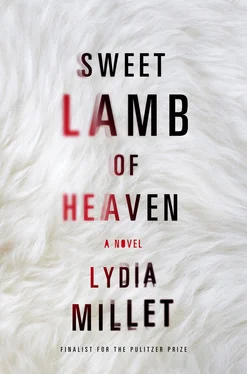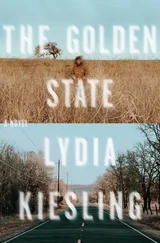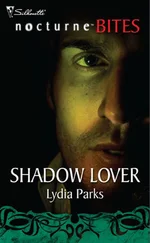But all around us the room seemed to be changing, though I couldn’t put my finger on it at first.
“Goodnight, little house. Goodnight, mouse,” read Lena. Her voice was muffled.
“Goodnight, comb. Goodnight, brush,” read Will. His voice, too, sounded like it was coming through a barrier.
They looked relaxed, as I’d left them, but around the bed they lay on other features shifted and altered. The desk lamp turned off and on rapidly, at irregular intervals; dust piled on surfaces and then seemed to go away, as though either blown or wiped; an object vanished and reappeared somewhere else, a toy on the round table, a glass. They didn’t take notice. Through a chink in the drapes I saw flashes of light outside. But it was night, and there shouldn’t have been light on that ocean side — so I ran past the foot of the bed to pull the drapes open where the big picture window looked over the cliffs and sea.
And I saw it was day. But then it was night, again, night in the sky and rapidly back to day. Boats appeared on the surface of the water, both far and nearer, then disappeared in an eye-blink, only to reappear elsewhere; the sky switched from morning to midday to evening to night within the space of seconds, and then did it again — this time with different cloud formations, other ships.
“Will, Will! What’s happening?” I shrieked, turning to look at him and Lena where they sat with their backs against the headboard, their legs stretched out on the bedspread.
But they seemed to be walled off. When I leaned over the bed to reach out to them something in the air resisted me. I couldn’t punch through the space around them, though I tried, increasingly desperate. Lena and Will looked the same as ever but I could see my hair growing in front of my eyes, my hair was getting longer and longer on my shoulders, inch by inch it moved down the front of my shirt, my hairs were visibly lengthening.
My little girl was looking calmly at her picture book, touching the drawings. She looked so normal, just here, just the way she should be. But I–I looked up at myself in the mirror. There was an ominous element to the growth of my hair, the choppy, almost digital-looking growth of the ends, so fast it was visible to the naked eye. There was something badly wrong. I wasn’t myself, but the image of me.
Lena’s fingernails were normal where they lay on the bottom edge of the pages of her book, bitten off a bit but normal: Goodnight, nobody, said the text on the page.
Beneath my own lengthening fingernails a line of dirt crept, growing along with the keratin.
I’d seen this somewhere, I thought, seen this somewhere before.
“OK,” I said, and made myself take deep breaths, count slowly. One of the hypnotic visions or a vivid nightmare — in any case nothing physically real, that was clear from the nails, from the hair — impossibility. I had to figure out the rules of the nightmare; possibly I could control it and wake myself up. I turned my back on Will and Lena and walked to the window again, where birds appeared on the cliff edge and then flicked away. The grass was greener, yes, the ice melted and springtime was here, even the color of the ocean changed from gray to a bluer hue, even the color of the sky.
I heard a voice in the other bedroom and went back through the interior door, reluctant to let Lena and Will out of my sight but pulled there somehow — still, all this was an effect, wasn’t it? An effect, I remember telling myself as the light kept changing up around me, lights shifted and went from dark to dim to bright. It was disorienting. But part of me also worried that I’d been drugged again and this would turn out to be another kidnapping, so I made sure the chain was on the room door. Dream or not, lock the door, I said as I went. Dream or not, lock the door.
The voice was coming from my laptop, open on the bed where I’d left it during my shower. I came up beside it and I could see the screen: Ned’s face. It was a video call, his head in a window on the screen — talking to someone else as I came up, his face in profile, but he turned and looked at me.
“A little fast-forwarding,” he said.
“What? What do you mean?”
“I hit the fast-forward button,” he repeated. “Didn’t you see? The kid. Your boy in there. They’re not going so fast, are they? You’re all alone.”
They were at regular speed, I realized. But I was sped up.
“You’re growing old,” said Ned, and smiled again. “See?”
I looked down: new wrinkles on my hands. Old hands. Somehow I’d moved through time alone — and yet still I spoke at normal speed, or else I couldn’t have talked to Ned; I still thought normally. Didn’t I?
“It’s impossible,” I said, more to myself than him. “It’s just a bad dream.”
“That’s what you do with losers, right? Isolate them. You’re one of the losers, wifey.”
“But how — why are you doing this? I was cooperating, Ned. I did what you asked, didn’t I? I don’t get it.”
“I’ve got the primaries in a few weeks and I need my pretty wife where I want her. A mental case, alone and needy. Makes them do what they’re told. Obedient. And a nice little bereavement in the family. Sympathy vote’s the icing on the cake. I look good in black. Well. I look good in everything.”
“A bereavement?”
“I took your time from you. You’ve missed a whole lot. Just take a look.”
Outside the picture window the sun was bright. Gnats and flies hung in the air. There were bunches of grass near the edge of the cliff and they were full green, bowing and dancing in the breeze.
“Ain’t we got fun?” said Ned.
Doris Day was singing it in the background. Not much money, oh but honey, ain’t we got fun. . There’s nothing surer: the rich get rich and the poor get children . .
I had a cold feeling. I was brittle as bone.
Had he made me a ghost?
I’d disappeared — I’d gone, slipped out of being like water down a drain. Was my girl alone now? Was Will looking after her?
“Like I said, we’re going out today,” he said. “We have a public appearance. Believe me, darlin’, it’s easier if you don’t fight it. Don’t get yourself all bothered. You won’t get anywhere, I promise. You’re confused, sure. You’re a sick woman. You’re weak. But it won’t be forever. You don’t have to go on that much longer like this. Just do what I say. OK? Put on the gown.”
I looked behind me and saw a black dress laid out on the second bed.
“I’ll see you outside,” he said. “Be on your good behavior, now. You see what I can do.”
His face went gray and for some reason I reached out and touched the screen softly. But it wasn’t warm, and fine dust came off on my fingertips. The laptop wasn’t even on. I raised my face: Lena and Will were standing in the doorway. Will wore a suit and Lena’s eyes were puffy.
We weren’t in the motel at all but in my parents’ house; I stood in my old bedroom. There was a rush of confusion that was almost a thrill, almost velocity. Then it stilled. Here was my corkboard with its colored pushpins and ribbons. PARTICIPANT. The air was humid and close; my parents had never had central air. I heard my father’s voice: they never “held with it.” I was wearing the black dress now, I saw, glancing down — no memory of changing into it — and toe-pinching black shoes with heels so high I could barely walk on them. I’d never have picked out those shoes.
I wouldn’t struggle. Don’t fight it, Ned had said sleazily. But it did hurt more if you struggled.
Prey animals had the sense to play dead.
So I leaned down and picked Lena up, though her weight made me stagger on the too-thin heels. But she was real and solid. I knew from her red eyes that she’d been crying and I squeezed her hard, maybe too urgently. Had all of us been frozen there? Had we all been suspended on Ned’s whim, or only me? I tried to see if Lena looked older. . I was flailing. It was possible, faintly possible that her face was more angular suddenly, but whatever slight change I might imagine wasn’t obvious like my long talons. I tried to keep them from scraping her back as I held her; I’d rip them off. They were like parasites on me.
Читать дальше












